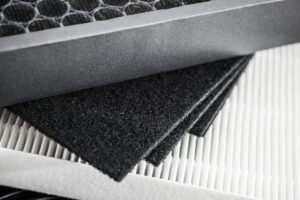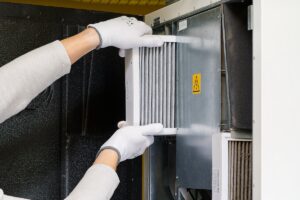Best Types of Air Filters
Maintaining clean and healthy indoor air is essential for our well-being, especially if your household members suffer from allergies, asthma, or other respiratory conditions or you have pets. To achieve the best indoor air quality available that boosts comfort and wellness, selecting the right air filter for your HVAC system is crucial, but since there are a myriad of options available on the market today, that can be challenging.
Air filters come with unique features, sizes, and compatibility requirements. To understand exactly what type of air filter is the best for your particular needs, you have to Learn how air filters work and make an informed decision.
You must consider filtration efficiency, airflow, maintenance requirements, compatibility, and cost-effectiveness. Here is what you should know about the best types of air filters on the market.

Fiberglass Filters
Fiberglass filters are among the most popular and affordable air filters around. They are made out of layered fiberglass fibers, designed to capture larger particles, such as dust and debris, while also allowing adequate airflow.
While these types of filters provide basic filtration, they have lower efficiency in capturing smaller particles. Yet, they are suitable for households with minimal air quality concerns and HVAC systems that can’t accommodate higher-rated filters. Fiberglass filters are disposable and require regular replacement.
Failure to replace them on time can result in clogged or dirty air filters, which will lower air quality, and if you or your household members have respiratory issues, these types of filters might not be the best choice as they cannot capture smaller particles efficiently.
Pleated Filters
Pleated filters offer superior filtration efficiency compared to fiberglass filters. They consist of a pleated synthetic material that increases the surface area available for capturing particles. Pleated filters are available in various MERV ratings, allowing you to select the filtration level that suits your needs. Check out what type of particle filters can capture based on their different MERV rating.
Usually, the minimum MERV rating for residential usage starts at MERV 8, but a MERV 8 air filter won’t be useful against allergens, pet dandruff, or other respiratory health issues. MERV 11 and MERV 13 air filters are generally good against most particles, but you can go even higher if you are a smoker or live in a polluted area for the best results.
Pleated air filters are usually efficient at trapping small particles such as pollen, mold spores, or pet danders, ultimately improving indoor air quality.
These filters have a longer lifespan and require less frequent replacement than fiberglass filters. Yet, pleated filters may slightly restrict airflow, so choosing a MERV rating that is compatible with your HVAC system is essential. Air filters with more pleats will provide better filtering, and they also come in reusable or disposable variants. Another advantage is that pleated air filters can suppress the noise from the HVAC fan, creating a quieter environment for the household. These air filters are usually more expensive than other filters, but they are generally worth it.
High-Efficiency Particulate Air (HEPA) Filters
HEPA filters are renowned worldwide for their exceptional filtration capabilities. They are capable of capturing 99.97% of particles as small as 0.3 microns. As a comparison, household dust can be anywhere from 0.5 to 100 microns.
HEPA filters are especially beneficial for individuals who suffer from allergies, asthma, or various other respiratory sensitivities. These filters are highly effective in removing microscopic particles such as pollen, bacteria, smoke, and dust mites from the air.
Apart from this, HEPA filters come in various forms, including standalone units and filters designed for HVAC systems. Due to their dense construction, HEPA filters may require a specialized HVAC system or modifications of existing units to accommodate the restricted airflow associated with these filters.
Although HEPA filters tend to have higher costs and may require more frequent replacement compared to other filter types, they make up for it since they also protect sensitive HVAC system components from dust and debris, increasing energy efficiency and boosting your system’s lifespan.
Electrostatic Filters
Electrostatic filters are also among the best types of air filters currently out there. These filters use an electrostatic charge to attract and capture particles as air passes through them and are made out of cotton and paper fibers. These filters can be either washable or disposable, depending on your preferences and system compatibility.
Washable electrostatic filters are constructed with reusable materials, allowing for repeated cleaning. Disposable electrostatic filters are treated with an electrostatic charge during manufacturing and are replaced when dirty.
Electrostatic filters have a high filtration efficiency, even higher than fiberglass filters, but lower compared to pleated or HEPA filters. These filters effectively capture larger particles but may be less efficient in trapping dust and mold spores.
Still, they offer a great balance between filtration performance and cost-effectiveness, making them a popular choice for many homeowners. With the washable variants, you won’t have to worry about replacements, and they are among the best filters that combat allergens as they act like a magnet, preventing particles from spreading throughout the house. You must ensure that you properly dry the washable filters before using them again. Depending on your preferences and needs, these types of air filters might be the way to go.
Activated Carbon Filters
Activated carbon filters are designed to remove odors, gasses, and volatile organic compounds (VOCs) from the air. These filters contain activated carbon, which has an extensive surface area that chemically absorbs and neutralizes odorous and harmful substances.
Activated carbon filters are often used in conjunction with other filter types to provide comprehensive air purification. They are especially beneficial for homes or workplaces concerned about smells, chemicals, or indoor pollutants. Yet, these types of air filters have limited effectiveness in capturing larger particles and may require more frequent replacement due to their absorption capabilities becoming saturated over time.
Selecting the Best Type of Air Filter
Selecting the best type of air filter for your HVAC system is crucial for maintaining clean and healthy indoor air. Each filter type, fiberglass, pleated, HEPA, electrostatic, and activated carbon, offers unique benefits and considerations.
Fiberglass filters are affordable and suitable for basic filtration needs, while pleated filters provide improved efficiency and longer lifespan. HEPA filters excel in capturing microscopic particles but require specialized systems.
Electrostatic filters balance efficiency and cost-effectiveness, and activated carbon filters target odors and gasses. There are other types of air filters out there, such as UV filters and others, which are effective at killing microorganisms but fail to eliminate common pollutants.
Each type of air filter comes with its pros and cons, but what matters is to consider your specific air quality concerns, system compatibility, airflow requirements, and maintenance preferences when choosing an air filter.
Regular filter replacement or cleaning is essential to ensure optimal filtration and system performance. You need to take care of your air filters to be satisfied with your air quality requirements, as unmaintained filters will also become less energy efficient, potentially leading to premature repairs and costly replacements.

Conclusion
By selecting the best air filter for your needs, you can enhance the air quality in your environment and promote a healthier home. Since choosing an air filter requires careful planning and preparation, consider consulting with an HVAC professional to guide you.
An HVAC professional can help you make an informed decision regarding proper air filters based on your system requirements and compatibility, respiratory issues, the presence of pets, the environment, your needs, and other crucial aspects.
